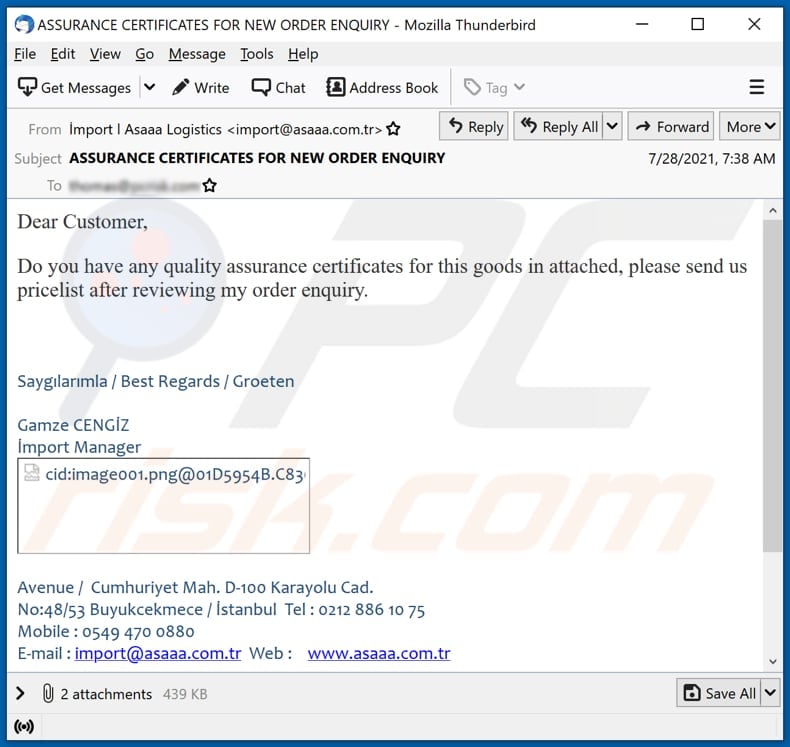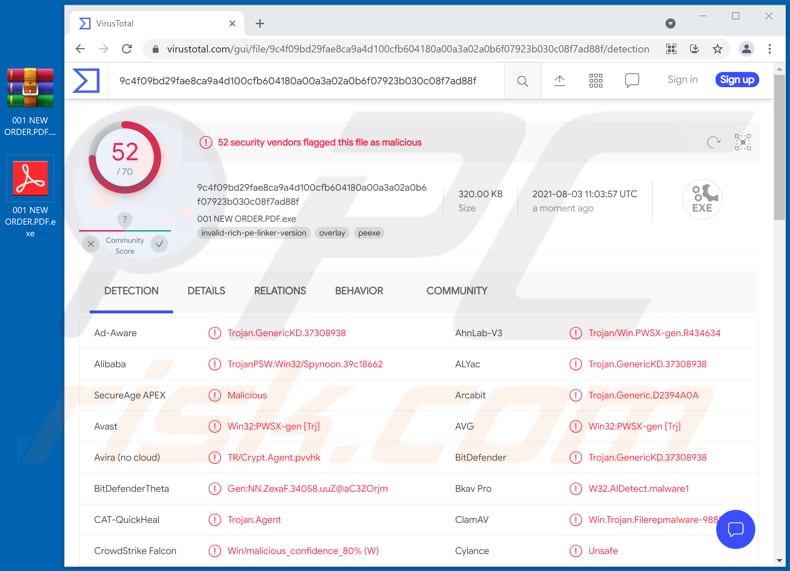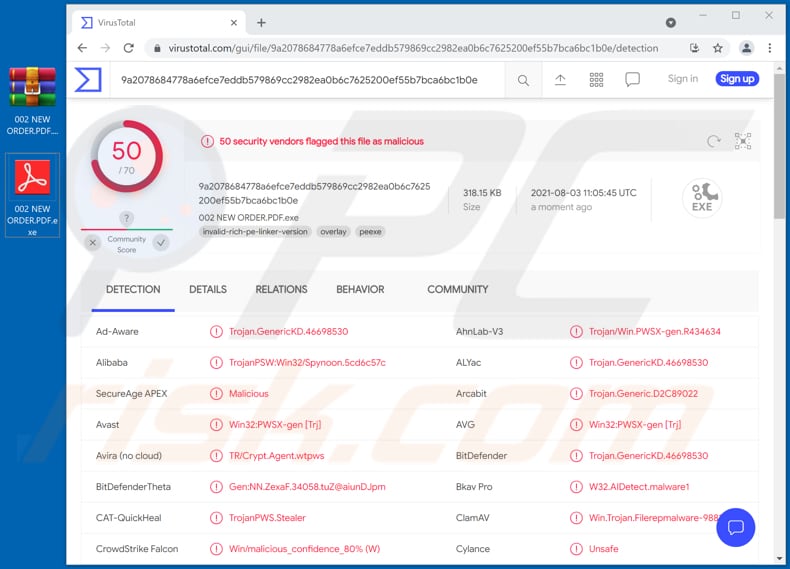How to remove Assurance Certificates email virus?
Phishing/ScamAlso Known As: Assurance Certificates spam
Get free scan and check if your device is infected.
Remove it nowTo use full-featured product, you have to purchase a license for Combo Cleaner. Seven days free trial available. Combo Cleaner is owned and operated by RCS LT, the parent company of PCRisk.com.
What is Assurance Certificates email virus?
When an email letter is used to deliver malware, it contains a malicious attachment or website link. In both cases, the main purpose of such email is to trick its recipients into opening a file designed to install malware on the operating system. This particular email is used to deliver FormBook malware.

Assurance Certificates email virus in detail
Usually, cybercriminals behind emails of this type pretend to be legitimate organizations, companies, or other entities and encourage recipients to open the attached file (or website link). Cybercriminals behind this email attempt to trick recipients into believing that the files attached to this email are quality assurance certificates.
The files attached to this email are named "001 NEW ORDER.PDF.rar" and "002 NEW ORDER.PDF.rar". The first archive file contains an executable file named "001 NEW ORDER.PDF.exe" and the second one contains another executable file named "002 NEW ORDER.PDF.exe". Both of these executable files are designed to install FormBook.
FormBook is a type of malware designed to steal information from web browsers and some other programs. This information stealer collects cookies, browsing history, Internet Protocol addresses, usernames, email address passwords (or other login credentials), credit card details (e.g., cardholder name, CVV number, expiry date), and other sensitive data.
Also, FormBook can operate as a keystroke logger. It means that this malware can record everything that victims type with their keyboard. Additionally, FormBook can install additional malware (e.g., ransomware, Trojan, cryptocurrency miner). This malware should be removed from infected computers as soon as possible.
| Name | Assurance Certificates spam |
| Threat Type | Trojan, password-stealing virus, banking malware, spyware. |
| Hoax | Files attached to this email are assurance certificates |
| Attachment(s) | 001 NEW ORDER.PDF.rar, 002 NEW ORDER.PDF.rar |
| Detection Names (001 NEW ORDER.PDF.exe) | Avast (Win32:PWSX-gen [Trj]), Combo Cleaner (Trojan.GenericKD.37308938), ESET-NOD32 (A Variant Of Win32/Kryptik.HLWI), Kaspersky (HEUR:Trojan-PSW.Win32.Stealer.gen), Microsoft (Trojan:Win32/Spynoon.PO!MTB), Full List Of Detections (VirusTotal) |
| Detection Names (002 NEW ORDER.PDF.exe) | Avast (Win32:PWSX-gen [Trj]), Combo Cleaner (Trojan.GenericKD.46698530), ESET-NOD32 (A Variant Of Win32/Kryptik.HLWI), Kaspersky (HEUR:Trojan-PSW.Win32.Stealer.gen), Microsoft (Trojan:Win32/Spynoon.PO!MTB), Full List Of Detections (VirusTotal) |
| Symptoms | Information stealers are designed to stealthily infiltrate the victim's computer and remain silent, and thus no particular symptoms are clearly visible on an infected machine. |
| Payload | FormBook |
| Distribution methods | Infected email attachments, malicious online advertisements, social engineering, software 'cracks'. |
| Damage | Stolen passwords and banking information, identity theft, the victim's computer added to a botnet. |
| Malware Removal (Windows) |
To eliminate possible malware infections, scan your computer with legitimate antivirus software. Our security researchers recommend using Combo Cleaner. Download Combo CleanerTo use full-featured product, you have to purchase a license for Combo Cleaner. 7 days free trial available. Combo Cleaner is owned and operated by RCS LT, the parent company of PCRisk.com. |
Malspam campaigns in general
Typically, cybercriminals behind emails used to deliver malware attempt to trick recipients into infecting their computers with malware designed to encrypt their files, steal sensitive information, distribute other malware, or mine cryptocurrency. More examples of malspam campaigns are "Order Loading Information", "LINPRA", and "Kaseya".
How did Assurance Certificates email virus infect my computer?
As mentioned previously, this email has two attachments: "001 NEW ORDER.PDF.rar" and "002 NEW ORDER.PDF.rar". Both of these RAR files contain a malicious executable file (the first archive file contains "001 NEW ORDER.PDF.exe", the second one contains "002 NEW ORDER.PDF.exe"). These EXE (executable) files install ForbmBook malware when users execute (open) them.
It is worth mentioning that emails used to deliver malware can contain different types of files, for example, Microsoft Office documents, PDF documents, JavaScript files. Typically, it is enough to open a malicious file so it could start the installation of malicious software.
However, malicious documents opened with Microsoft Office 2010, and newer need permission to enable macros commands (editing/content) so they could infect computers. It does not apply to malicious documents opened with older MS Office versions - older versions do not have the "Protected View" mode.
How to avoid installation of malware?
Emails containing attachments or website links should be examined. Especially if received emails are not relevant and sent from an unknown, suspicious address. It is common for the email to be used as a channel to deliver malware. Another important thing is to download files, programs from legitimate, trustworthy sources such as official websites and use direct download links.
Installed software has to be updated and activated with tools or functions provided by its official developers. Any other (third-party, unofficial) tools can be malicious. Moreover, it is not legal to use cracking tools to activate legitimate software or use pirated (cracked) software.
Additionally, it is recommended to have a reputable antivirus or anti-spyware software installed on the operating system and scan it for threats regularly. If you've already opened "Assurance Certificates email virus" attachment, we recommend running a scan with Combo Cleaner Antivirus for Windows to automatically eliminate infiltrated malware.
Text presented in the Assurance Certificates email letter:
Subject: ASSURANCE CERTIFICATES FOR NEW ORDER ENQUIRY
Dear Customer,
Do you have any quality assurance certificates for this goods in attached, please send us pricelist after reviewing my order enquiry.
Saygılarımla / Best Regards / Groeten
Gamze CENGİZ
İmport Manager
Avenue / Cumhuriyet Mah. D-100 Karayolu Cad.
No:48/53 Buyukcekmece / İstanbul Tel : 0212 886 10 75
Mobile : 0549 470 0880
E-mail : import@asaaa.com.tr Web : www.asaaa.com.tr
Nakliye sigortanızı yaptırdınız mı ? CMR sigortalarında nakliyecinin sorumluluğun kg bazında değer limiti olduğunu biliyor musunuz? Taşımacı firmanın önüne geçemeyeceği ( sel,deprem,doğal afet v.b) ve engelleyemeceği nedenlerden hasar meydana geldiğinde hukuksal sorumluluğun olmadığını biliyor muydunuz ?
Screenshot of the file named "001 NEW ORDER.PDF.rar" detected as malicious:

Screenshot of the file named "002 NEW ORDER.PDF.rar" detected as malicious:

Instant automatic malware removal:
Manual threat removal might be a lengthy and complicated process that requires advanced IT skills. Combo Cleaner is a professional automatic malware removal tool that is recommended to get rid of malware. Download it by clicking the button below:
DOWNLOAD Combo CleanerBy downloading any software listed on this website you agree to our Privacy Policy and Terms of Use. To use full-featured product, you have to purchase a license for Combo Cleaner. 7 days free trial available. Combo Cleaner is owned and operated by RCS LT, the parent company of PCRisk.com.
Quick menu:
- What is Assurance Certificates spam?
- Types of malicious emails.
- How to spot a malicious email?
- What to do if you fell for an email scam?
Types of malicious emails:
![]() Phishing Emails
Phishing Emails
Most commonly, cybercriminals use deceptive emails to trick Internet users into giving away their sensitive private information, for example, login information for various online services, email accounts, or online banking information.
Such attacks are called phishing. In a phishing attack, cybercriminals usually send an email message with some popular service logo (for example, Microsoft, DHL, Amazon, Netflix), create urgency (wrong shipping address, expired password, etc.), and place a link which they hope their potential victims will click on.
After clicking the link presented in such email message, victims are redirected to a fake website that looks identical or extremely similar to the original one. Victims are then asked to enter their password, credit card details, or some other information that gets stolen by cybercriminals.
![]() Emails with Malicious Attachments
Emails with Malicious Attachments
Another popular attack vector is email spam with malicious attachments that infect users' computers with malware. Malicious attachments usually carry trojans that are capable of stealing passwords, banking information, and other sensitive information.
In such attacks, cybercriminals' main goal is to trick their potential victims into opening an infected email attachment. To achieve this goal, email messages usually talk about recently received invoices, faxes, or voice messages.
If a potential victim falls for the lure and opens the attachment, their computers get infected, and cybercriminals can collect a lot of sensitive information.
While it's a more complicated method to steal personal information (spam filters and antivirus programs usually detect such attempts), if successful, cybercriminals can get a much wider array of data and can collect information for a long period of time.
![]() Sextortion Emails
Sextortion Emails
This is a type of phishing. In this case, users receive an email claiming that a cybercriminal could access the webcam of the potential victim and has a video recording of one's masturbation.
To get rid of the video, victims are asked to pay a ransom (usually using Bitcoin or another cryptocurrency). Nevertheless, all of these claims are false - users who receive such emails should ignore and delete them.
How to spot a malicious email?
While cyber criminals try to make their lure emails look trustworthy, here are some things that you should look for when trying to spot a phishing email:
- Check the sender's ("from") email address: Hover your mouse over the "from" address and check if it's legitimate. For example, if you received an email from Microsoft, be sure to check if the email address is @microsoft.com and not something suspicious like @m1crosoft.com, @microsfot.com, @account-security-noreply.com, etc.
- Check for generic greetings: If the greeting in the email is "Dear user", "Dear @youremail.com", "Dear valued customer", this should raise suspiciousness. Most commonly, companies call you by your name. Lack of this information could signal a phishing attempt.
- Check the links in the email: Hover your mouse over the link presented in the email, if the link that appears seems suspicious, don't click it. For example, if you received an email from Microsoft and the link in the email shows that it will go to firebasestorage.googleapis.com/v0... you shouldn't trust it. It's best not to click any links in the emails but to visit the company website that sent you the email in the first place.
- Don't blindly trust email attachments: Most commonly, legitimate companies will ask you to log in to their website and to view any documents there; if you received an email with an attachment, it's a good idea to scan it with an antivirus application. Infected email attachments are a common attack vector used by cybercriminals.
To minimise the risk of opening phishing and malicious emails we recommend using Combo Cleaner Antivirus for Windows.
Example of a spam email:

What to do if you fell for an email scam?
- If you clicked on a link in a phishing email and entered your password - be sure to change your password as soon as possible. Usually, cybercriminals collect stolen credentials and then sell them to other groups that use them for malicious purposes. If you change your password in a timely manner, there's a chance that criminals won't have enough time to do any damage.
- If you entered your credit card information - contact your bank as soon as possible and explain the situation. There's a good chance that you will need to cancel your compromised credit card and get a new one.
- If you see any signs of identity theft - you should immediately contact the Federal Trade Commission. This institution will collect information about your situation and create a personal recovery plan.
- If you opened a malicious attachment - your computer is probably infected, you should scan it with a reputable antivirus application. For this purpose, we recommend using Combo Cleaner Antivirus for Windows.
- Help other Internet users - report phishing emails to Anti-Phishing Working Group, FBI’s Internet Crime Complaint Center, National Fraud Information Center and U.S. Department of Justice.
Share:

Tomas Meskauskas
Expert security researcher, professional malware analyst
I am passionate about computer security and technology. I have an experience of over 10 years working in various companies related to computer technical issue solving and Internet security. I have been working as an author and editor for pcrisk.com since 2010. Follow me on Twitter and LinkedIn to stay informed about the latest online security threats.
PCrisk security portal is brought by a company RCS LT.
Joined forces of security researchers help educate computer users about the latest online security threats. More information about the company RCS LT.
Our malware removal guides are free. However, if you want to support us you can send us a donation.
DonatePCrisk security portal is brought by a company RCS LT.
Joined forces of security researchers help educate computer users about the latest online security threats. More information about the company RCS LT.
Our malware removal guides are free. However, if you want to support us you can send us a donation.
Donate
▼ Show Discussion